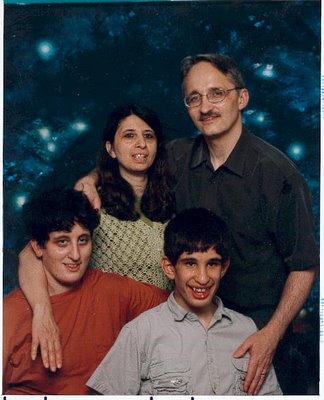Monday, December 25, 2006
And Now For Something Exotic/All the Way From Sweden
Söndag, december 24. 2006
Dagens citat IVPs kommentar till Matteus skildring av Jesu födelse.
Matthew challenges prejudice against pagans. The first story after Jesus' birth opens with Magi who have traveled a long distance to offer homage to a new king born in Judea. They enter Jerusalem with a large enough caravan to attract the city's attention (2:3); they must have assumed that they would find the newborn king in Herod's palace in Jerusalem.
Matthew challenges prejudice that favors political power. Another central character in this narrative is Herod (2:3, 7-8). That Herod is dismayed by the Magi's announcement is not surprising (2:3); in this period most Greeks, Romans and even Jews respected astrological predictions. Further, a cosmic signal of another ruler would necessarily indicate the end of the current ruler's reign. Other rulers also proved paranoid about astrologers, and some had been ready to kill their own descendants to keep the throne.
Matthew challenges the prejudice that respects spiritually complacent religion. Not knowing himself where the king would be born, Herod gathers the religious experts, the chief priests and scribes (2:4), most of whom in this period were loyal to his agendas. These experts immediately identify the place where the Messiah will be born on the basis of Micah 5:2 (Mt 2:5-6). But while the religious leaders know where the Messiah will be born, they do not join the Magi in their quest. These are the religious leaders, but they fail to act on all their Bible knowledge. Jesus is just a baby, and they take him for granted.
Matthew reinforces these points by reminding us that it is the pagans who worshiped Jesus. After the Magi have left Jerusalem, they come and worship Jesus (2:9-11). A road led south to Bethlehem, which was about six miles from Jerusalem, so the rest of the Magi's journey probably did not take very long. That they offer Jesus both homage and standard gifts from the East (2:11) fits Eastern practices; for instance, royal courts there used frankincense and myrrh.
(Tänk också på herdarna. Herdarna ansågs som syndiga och bara lite bättre än spetälska och prostituerade, eftersom de inte kunde hålla sabbaten. Att de kommer och tillber utmanar vår tendens att ge de framgångsrika och lyckade företräde framför de fattiga och utstötta.)
Inlagd av Daniel Astgård i Citat kl 07:39 Kommentar (1)
Kommentarer
Visa kommentarer som (Linjär Trådad)
great postthe metaphor of the curtain of partition being torn in two at the crucifixion is very powerfuli think it maybe the ultimate purpose of his life and deathbreaking down walls of separation and barriers to love and communitybringing us out of tribalism and even individualism into the body of Christ, the new man, the ultimate goal and purpose of creation, incarnation and recreation..
#1 len (Link) på 2007-01-03 19:12 (Svara)
Lägg till kommentar
Dagens citat IVPs kommentar till Matteus skildring av Jesu födelse.
Matthew challenges prejudice against pagans. The first story after Jesus' birth opens with Magi who have traveled a long distance to offer homage to a new king born in Judea. They enter Jerusalem with a large enough caravan to attract the city's attention (2:3); they must have assumed that they would find the newborn king in Herod's palace in Jerusalem.
Matthew challenges prejudice that favors political power. Another central character in this narrative is Herod (2:3, 7-8). That Herod is dismayed by the Magi's announcement is not surprising (2:3); in this period most Greeks, Romans and even Jews respected astrological predictions. Further, a cosmic signal of another ruler would necessarily indicate the end of the current ruler's reign. Other rulers also proved paranoid about astrologers, and some had been ready to kill their own descendants to keep the throne.
Matthew challenges the prejudice that respects spiritually complacent religion. Not knowing himself where the king would be born, Herod gathers the religious experts, the chief priests and scribes (2:4), most of whom in this period were loyal to his agendas. These experts immediately identify the place where the Messiah will be born on the basis of Micah 5:2 (Mt 2:5-6). But while the religious leaders know where the Messiah will be born, they do not join the Magi in their quest. These are the religious leaders, but they fail to act on all their Bible knowledge. Jesus is just a baby, and they take him for granted.
Matthew reinforces these points by reminding us that it is the pagans who worshiped Jesus. After the Magi have left Jerusalem, they come and worship Jesus (2:9-11). A road led south to Bethlehem, which was about six miles from Jerusalem, so the rest of the Magi's journey probably did not take very long. That they offer Jesus both homage and standard gifts from the East (2:11) fits Eastern practices; for instance, royal courts there used frankincense and myrrh.
(Tänk också på herdarna. Herdarna ansågs som syndiga och bara lite bättre än spetälska och prostituerade, eftersom de inte kunde hålla sabbaten. Att de kommer och tillber utmanar vår tendens att ge de framgångsrika och lyckade företräde framför de fattiga och utstötta.)
Inlagd av Daniel Astgård i Citat kl 07:39 Kommentar (1)
Kommentarer
Visa kommentarer som (Linjär Trådad)
great postthe metaphor of the curtain of partition being torn in two at the crucifixion is very powerfuli think it maybe the ultimate purpose of his life and deathbreaking down walls of separation and barriers to love and communitybringing us out of tribalism and even individualism into the body of Christ, the new man, the ultimate goal and purpose of creation, incarnation and recreation..
#1 len (Link) på 2007-01-03 19:12 (Svara)
Lägg till kommentar
Subscribe to:
Post Comments (Atom)


No comments:
Post a Comment